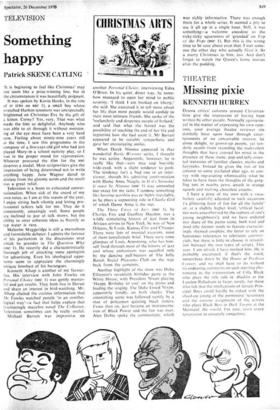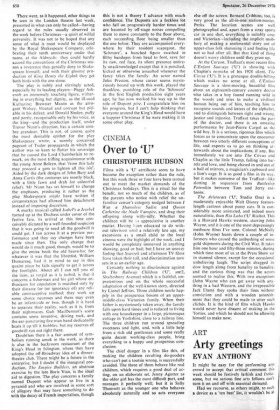THEATRE
Missing pixie
KENNETH HURREN
Drama critics' columns around Christmas- time give the impression of having been written by other people. Normally egomania- cal in the matter of expressing his own opin- ions, your average theatre reviewer sits dutifully hour upon hour through enter- tainments of no conceivable interest, let alone delight, to grown-up people, yet ten- derly recoils from recording the malevolent thoughts that have crossed his mind in the presence of these inane. pop-and-telly-orien- ted travesties of familiar classics, myths and fairytales. Instead he gives the run of his column to some pixilated alter ego, to con- vey with ingratiating whimsicality what he takes to have been the thoughts of the gurg- ling tots in nearby pews, awash in orange squash and melting chocolate creams.
I have a pixie of my own with a voca- bulary carefully adjusted to such occasions Ca glittering feast of fun for all the family' or. at a slightly higher level, 'critical facul- ties were anaesthetised by the rapture of one's young neighbours'), and we have endured our share of the panto scene, both trad and mod (the former tends to feature excruciat- ingly rhymed couplets, the latter to rely on humorous references to television commer- cials, but there is little to choose in infantil- ism between the two types of script). This year. I am afraid. I have mislaid him. He is probably encamped, if that's the word, somewhere down by the House at I'oohves Corner: and we shall have to do without his endearing comments on such startling phe- nomena as the transvestism of Cilia Black who plays the title role in Aladdin at the London Palladium (a facer. surely, for those who felt that the implications of female Prin- cipal Boys could hardly be risked with the clued-up young of the permissive 'seventies) and the curious assignment of the actress who plays Black Bess in Dick Turpin at the Mermaid. He would. I'm sure, resist every temptation to unseemly conjecture.
There were, as it happened, other things to be seen in the London theatre last week,
presented in what can only be called—having regard to the rules usually observed in the week before Christmas—a spirit of wilful perversity. It was not to be hoped that any sense of what is meet would be displayed by the Royal Shakespeare Company, cele- brating their tenth anniversary under that name, at the Aldwych: they could hardly accord the conventions of the Christmas sea- son a reverence they genially deny to Shake- speare himself; and with their gloomy pro- duction of King Henry the Eighth they get both birds with the one stone.
The play is nobly and stirringly acted, especially by its leading players—Peggy Ash-
croft an immensely touching figure, wither- ing in everything but dignity, as the ill-used Katharine; Brewster Mason as the arro- gant Wolsey, bloated and corrupt but piti- able in his defeat; and Donald Sinden, puffy and portly, recognisable only by his voice, as the king—and the production itself, under Trevor Nunn's direction, has a certain som- bre grandeur. This is not, of course, quite the most desirable epithet for the play Shakespeare wrote, a sunnily conceived pageant of Tudor propaganda in which the author was so keen to flatter his sovereign that he caused the Lord Chamberlain to re- mark, on the most trifling acquaintance with the young Anne Boleyn, that 'from this lady may proceed a gem to lighten all this isle'. Aided by the dark designs of John Bury and Anna Curtis (the costumes are mostly black, with a little fawn and drab for colourful relief), Mr Nunn has set himself to change the emphases, producing it rather as the play Shakespeare might have written if circumstances had allowed him detachment instead of imposing discretion.
A murky musical called Isabel's a Jezebel turned up at the Duchess under cover of the festive fare, its arrival at this time con- ceivably dictated by a well-founded suspicion that it was going to need all the goodwill it could get. I ran across it at a preview per- formance and they say changes have been made since then. The only change that would do it much good, though, would be to give the entire book the old heave-ho; for whatever it was that the librettist, William Dumaresq, had it in mind to say in this quaint piece he fails signally to get it across the footlights. About all I can tell you of the item, as turgid as it is turbid, is that it concerns a fisherman and his girl whose en- thusiasm for copulation•is matched only by their distaste for (or ignorance of) any reli- able contraceptive method; they work up some choice neuroses and there may even be an infanticide or two, though it is hard to separate their reality, such as it is, from their nightmares. Galt MacDermot's score contains some inventive, driving rock, and the ear-puncturing five-man band dedicatedly heats it up till it bubbles; but my reserves of goodwill run out right there. Doubtless there is a fair amount of sym- bolism running amok in the work, as there is also in the backroom restaurant of the King's Head in Islington, where they have adopted the off-Broadway idea of a dinner- theatre club. There might be a future in the enterprise, but I doubt if the inaugural pro- duction, The Empire Builders, an abstruse exercise by the late Boris Vian,ls the ideal aid to digestion. The play concerns a family named Dupont who appear to live in a pyramid and who are involved in some sort of allegory that may have something to do with the decay of French imperialism, though
this is not a theory I advance with much confidence. The Duponts are a feckless lot who fall on progressively harder times and are haunted by off-stage noises compelling them to move constantly to the floor above, each succeeding floor being smaller than the one below. They are accompanied every- where by their resident scapegoat, the `Schmurz', a hunched figure swathed in filthy bandages from head to foot, save for its raw, red face, its silent presence entire- ly unacknowledged except that it is punched, kicked or otherwise assaulted whenever the fancy takes the family. An actor named John Preston, whose career seems myste- riously bound up with this work, played the thankless, punishing role of the Schmurz' in the first English production eight years ago; he has now worked his way up to the role of Dupont pere. I congratulate him on his progress, but I can't help thinking that everyone around the King's Head would have a happier Christmas if he were making it in some other play.



















































 Previous page
Previous page